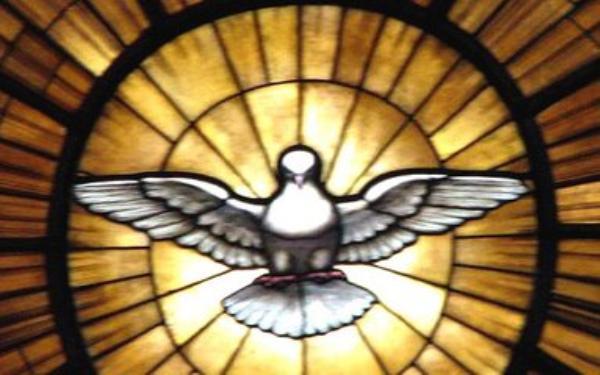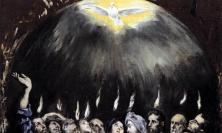‘The feast of Pentecost is a celebration of the mysterious movement of God in our lives through the outpouring of the Holy Spirit.’ Sr Teresa White came across a useful analogy that can help us to contemplate the presence of the Holy Spirit in our lives, which she reflects on ahead of Pentecost Sunday.
A few years ago on Pentecost Sunday, the homilist at Mass, commenting on the reading from chapter 2 of Acts of the Apostles, compared the Holy Spirit to a satellite navigation device. At first I thought it an unattractive idea, prosaic in the extreme. Not only did it belittle the Spirit to liken it to a handy gadget, I felt, but it failed to honour the poetry and mystery of the Third Person of the Trinity. But reflecting on the idea later that day, I began to warm to it. Perhaps because I have such an abysmal sense of direction and have discovered by personal experience just how helpful a sat nav can be, I felt the simile was not only justified but remarkably apt. A sat nav guides the driver, and although it repeats its instructions more than once if you do not follow them, it does not attempt to force you to do what it tells you. Its most appealing feature, in my opinion, is that if you persist in ignoring what the disembodied but clearly audible voice suggests, it recalculates and proposes an alternative route. The only thing you have to do is make sure you switch on the device and give it time to warm up and tune in to the satellite signals. Then you just watch the screen, listen to the directives and make your own decision about whether or not to follow them.
So how, we could ask, do we tune in to the Spirit? First and foremost, like the driver to the sat nav, we need to be attentive to God’s presence and power in our lives. The gift of the Spirit is never forced upon us. All we have to do is to open ourselves freely to receive the new life it offers. John V. Taylor says, ‘The Spirit is as free and unpredictable as the wind which blows where it wills. You simply ask for it; ask and wait trustfully; and let yourself come alive. Have the courage to lower the barriers, and welcome life’. Hildegard of Bingen has the same message. ‘The Holy Spirit … is radiant life,’ she wrote, ‘awakening and enlivening all things’. On a sat nav, we set our own destinations, to which we believe we will be taken. Could we be said to do the same, in a spiritual sense, by seeking the Kingdom of God?
The feast of Pentecost is a celebration of the mysterious movement of God in our lives through the outpouring of the Holy Spirit. In the opening chapters of the Acts of the Apostles, Luke describes the early Church in idealistic terms. He tells us that on the day of Pentecost the whole group of believers were ‘filled with the Holy Spirit’, and, as a result, they were all ‘united, heart and soul’. Yet not long afterwards we hear of a married couple who tried to deceive the community, and of division and bitter disputes among the first Christians. So it seems that to be filled with the Spirit is not a permanent condition – we need to keep on receiving it. The Spirit comes to us and to our communities, as St Paul says, to help us in our weakness (Romans 8), to encourage and inspire us in the midst of our failures and imperfections. The Spirit comes to ‘renew the face of the earth’, to strengthen and revive us. Like the sat nav, the Spirit guides us along the right path, but is always ready to recalculate when we go astray.
There is no mistaking the presence of the Spirit in the life of the believer. The tradition speaks of the ‘fruits’ of that presence, of the spiritual energy it generates. Describing the fruits of the Spirit, those perceptible attributes of a transformed life, Dietrich Bonhoeffer wrote, ‘Fruit is always the miraculous, the created; it is never the result of willing, but always a growth. The fruit of the Spirit is a gift of God, and only He can produce it. They who bear it know as little about it as the tree knows of its fruit. They know only the power of Him on whom their life depends’ (The Cost of Discipleship). That power on whom all life depends is the Holy Spirit, hovering over the chaos, moving through God’s people – sustaining them, restoring them, challenging them, stirring them up, calling them on to good, revealing to them the daily miracles of creation.
The Spirit-filled person lives intensely in the here and now. He or she is alive with the energy of love, moved by the energy of joy. Instead of being crushed and embittered by the sorrows of life, such a person retains a peaceful energy in the midst of pain and suffering. Patience, kindness and sheer goodness are further signs, instantly recognisable, of the presence of the Spirit, as are trustworthiness and gentleness, modesty, unforced self-control and readiness to forgive. Just as a sat nav guides us to our destination when we are unsure of our route, the Spirit enables us (to borrow the words of John O’Donohue), ‘to walk into the future with hope and trust, without knowing precisely how things will turn out’, but with complete confidence in the providence of God.
Teresa White FCJ is a member of the European Province of the Sisters of Faithful Companions of Jesus.






